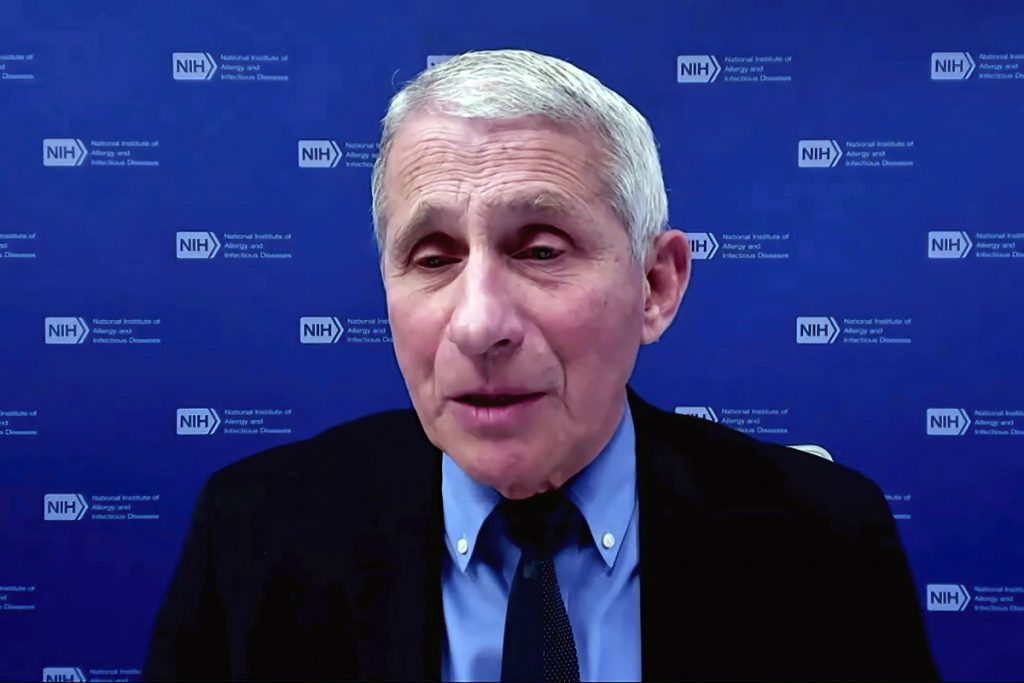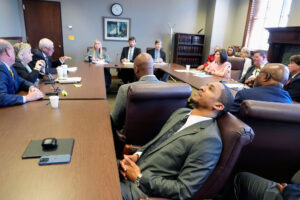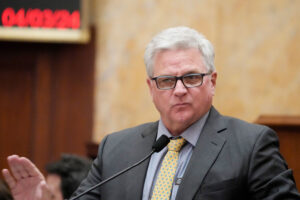Dr. Anthony Fauci joined state public-health leadership at Tougaloo College today to address America’s history of medical racism and the barriers to equitable COVID-19 vaccine distribution.
The medical experts spoke in turn over Zoom, with Dr. Fauci, director of the National Institute for Allergies and Infectious Diseases and top coronavirus adviser to President Joe Biden, leading the event with a candid commentary on the medical establishment’s historical treatment of Black Americans.
“Historically, if you look at how the government, in medical matters, has treated African Americans, that history is not really history,” Fauci said. “It goes back to Tuskegee, and the terrible situation there.”
The Tuskegee Syphilis Study is the most well-publicized example of medical racism in modern American history. For four decades, between 1932 and 1972, 600 poor Black Alabaman sharecroppers were enrolled in a sham study that exposed them to fake treatments for syphilis, with the intent to study the destructive effect of the virus when untreated.
The experimentation directly caused the deaths of 128 of the subjects, and caused untold damage to many others, including children born with congenital syphilis, in spite of the fact that simple penicillin treatments to cure the disease were available decades before the study’s end.
Fauci said that enormous strides in medical ethics and oversight will prevent the crimes of the Tuskegee experiment. In the case of COVID-19, neither the federal government nor a pharmaceutical company gave the vaccines final approval. Instead, transparent and ethically organized review entities offered the final say on the effectiveness and safety of vaccines.
“The ones who determine whether it’s OK to distribute it to the American public are the career scientists—not politicians, not people who you feel might have a vested interest,” Fauci explained, adding, “this is the reason I got vaccinated, the reason why President Biden and Vice President Harris got vaccinated, because of the confidence in the safety and efficacy.”
Vaccine Disparity Improving, Trust Shaky
Joining Fauci on the panel were Dr. Thomas Dobbs, state health officer; Dr. Obie McNair, chief operating officer of Central Mississippi Health Services; and Dr. Myrna Alexander-Nickens, cardiologist at the University of Mississippi Medical Center.
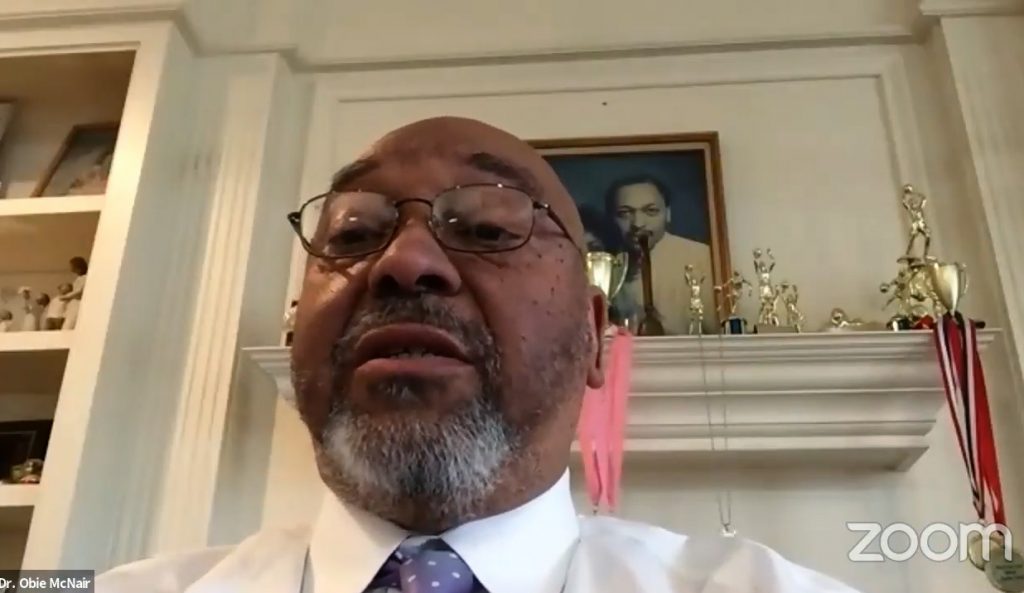
Dobbs shared new information on public perception of the vaccine, as well as updates on the racial disparity seen in the vaccine rollout itself. The Mississippi Department of Health produced data today showing that the dismal percentage of vaccinations going to Black Mississippians is improving. “We’ve gone from 13% to 21%,” Dobbs said. “That’s not OK, but it’s progress,” Dobbs said. Black Mississippians make up roughly 38% of Mississippi’s total population.
MSDH has released preliminary results from a survey of Mississippians’ willingness to get vaccinated, revealing some effects of the country’s long legacy of unequal treatment. In total, 72% of all Mississippians responded that they were actively planning to take the COVID-19 vaccine. Another 12% said they were unsure. A final 16% affirmatively answered that they would not be getting vaccinated.
Breaking those numbers down, MSDH’s survey presents a clear picture of Black reticence to getting vaccinated. While 66% of white Mississippians responded that they “definitely will” get the vaccine, only 40% of Black Mississippians responded the same way. Nearly 22% of Black Mississippians that MSDH polled acknowledged that they were “Not sure” if they would get vaccinated, the second most common answer for that demographic.
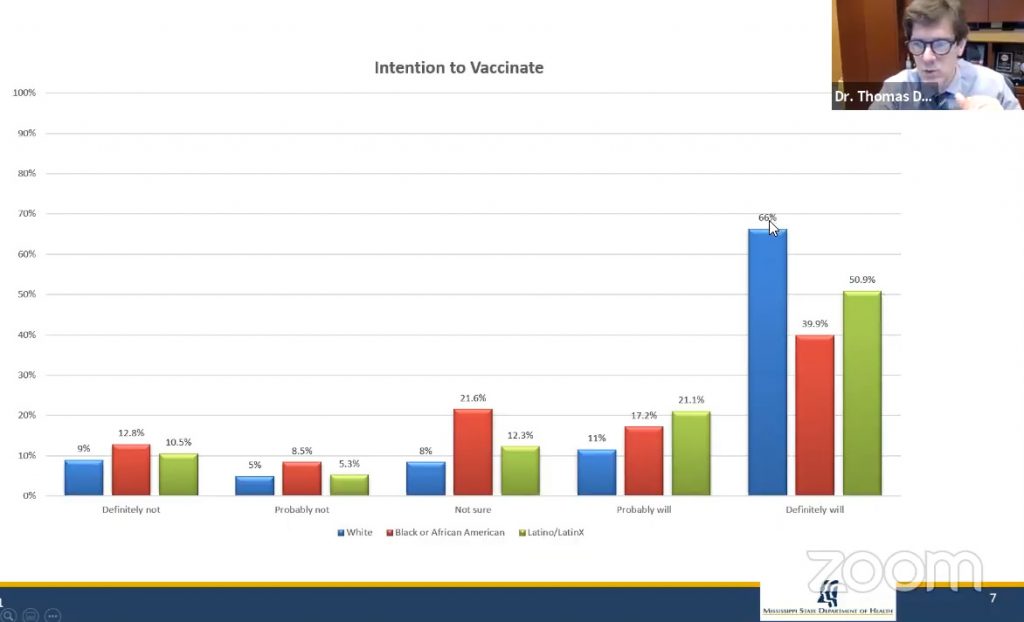
In total, nearly half of all Black respondents indicated some uncertainty in their intention to vaccinate, and it is this population that MSDH hopes to convince with outreach efforts and increased access to the vaccine. To that end, Dobbs mentioned direct engagements with Black church leadership and an ongoing vaccination project with the City of Jackson.
Dr. McNair warned that social-media misinformation was harming the effort, with rumors and hoaxes eroding trust in valued sources of information.
Additionally, McNair highlighted the “basic tenet” of health-care access:—Medicaid expansion—arguing that no single initiative would be better suited to address rural health-care access.
“One of the reasons you see such reticence in the Black community is to take the vaccine is that a lot of information is out there that’s not correct, especially on the internet,” McNair said. “Let’s not let the internet practice medicine for us.”
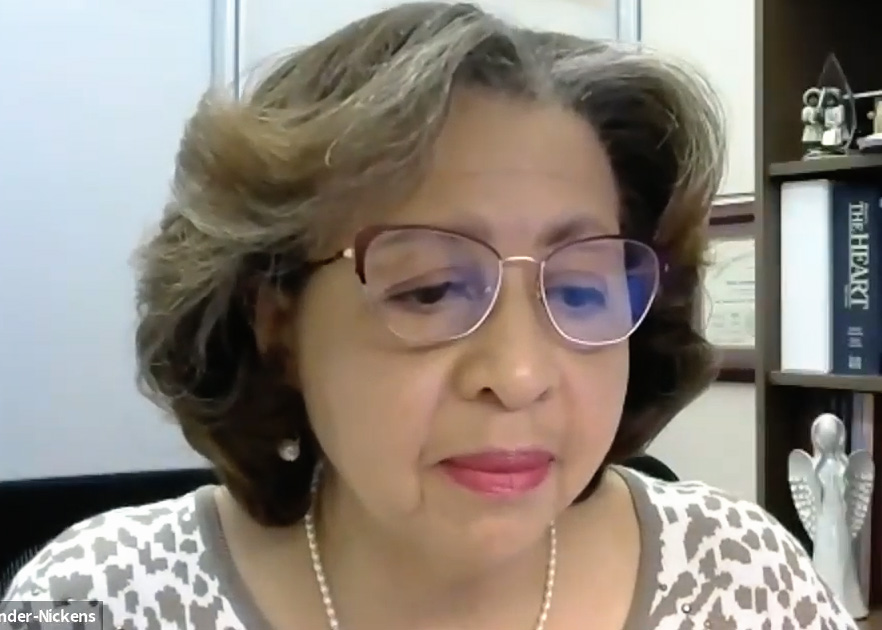
On the subject of access, Dr. Alexander-Nickens highlighted the key role of community health centers in extending the reach of the vaccine into underserved areas. Alexander-Nickens mentioned Jackson-Hinds Comprehensive Health Center, a federally qualified community health center on Northside Drive, as a particular leader in vaccinations.
“In our community they really picked up and got doses in arms,” Alexander-Nickens said.


